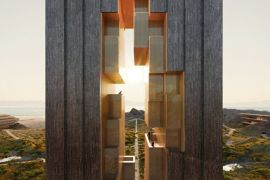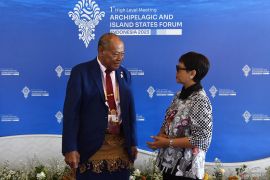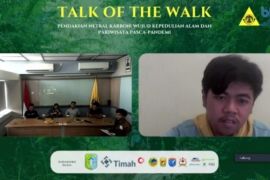Ecotourism is a new travel ethic developed in response to the increasing appreciation of nature experiences and tourism, as the worlds largest industry, with nature tourism being the fastest growing segment.
The country is promoting ecotourism in numerous regions as one of the means to protect its rainforests while helping the communities explore alternative sources of income for sustainable development.
In light of this, the Way Kambas National Park (WKNP) in East Lampung district, Lampung Province, is developing an ecotourism village as a secondary tourist destination in one of the two areas within the park.
The WKNP is home to a wide array of flora and fauna, several of which are endangered and only found in this part of the world.
With swamp forest, lowland rainforest, mangrove forest, dry beach forest, and expanses of grassland, this national park is an ideal habitat for thousands of different species and offers exciting opportunities for visitors to experience some of Indonesias most diverse wildlife.
WKNP coordinator Sukatmono stated in East Lampung on Thursday that the WKNP Great Hall is currently designing the development of an ecotourism village as a secondary destination for visitors.
He noted that tourists visiting the ecotourism village in the WKNP will be able to experience the extensive flora and fauna and have the opportunity to witness and learn about the endangered Sumatran elephant, rhinoceros, and tiger along with a vast array of other exotic animals, such as monkeys, tapirs, leopards, and birds.
"The development of ecotourism aims to increase the number of tourist visits to the WKNP in addition to boosting the economy of the local community," Sukatmono noted.
He further explained that the ecotourism village also offers homestays, various handicrafts of the local village, and a variety of cuisines typical to the region for the visitors.
According to Sukatmono, the Great Hall of WKNP is collaborating with local NGOs to develop and manage the ecotourism village.
Besides, the Seblat Nature Park in North Bengkulu district, Bengkulu province, is also offering the the sensation of interacting with endangered Sumatran elephants in Seblat Elephant Training Center.
Rosalina, one domestic travelers, said in Bengkulu recently that her first interaction with the unique wildlife of Sumatra becomes an unforgettable experience, because it is hard to find in other tourist attractions.
"Meeting the elephants in their unspoiled habitat and bathe them in the river is a unique and unforgettable experience," she remarked at the Seblat Nature Park.
According to her, the Seblat Nature Park ecotourism has a great potential to be developed into one of the natural tourist destination in Bengkulu.
"Moreover, to reach the location is not too difficult. Even two days one night tour can be enjoyed with a variety of activities, such as feeding and bathing the elephants," she said.
The Sukabaru Ecotourism Forum members, Anang Widyatmoko, said people who live around the Seblat Nature Park provide travel packages and tourist guides for the visitors who want to enjoy the natural beauty of the park.
"We provide a package with the concept of tourism and conservation," he said, adding that they also offer the visitors with
fishing in the river, bird-watching, and enjoying the beauty of two waterfalls in area.
In the meantime, Kapuas Hulu Culture and Tourism Department spokesman Antonius stated that the road map document on the development of ecotourism in the district was completed in 2014.
Antonius pointed out that the management of ecotourism will be carried out by the Melemba village communities who are encouraged through the Village-owned Enterprises (BUMDes).
In the Indonesian island resort of Bali, eco-tourism is also developed in the areas where the "subak traditional irrigation method is being applied by empowering the local farmers.
"Empowering the farmers on the basis of sustainable nature will improve their welfare, manage the wealth of the local economy, and improve the integrity of local ecosystem," agricultural observer Gede Sedana has stated in Denpasar.
The dean of Dwijendra Universitys Faculty of Agriculture noted that eco-tourism development is based on natural attraction with regard to support rural and cultural tourism.
According to him, eco-tourism includes a number of important aspects concerning sightseeing tour, natural environment, local community involvement, local culture, and sustainability of the environment.
Gede Sedana then explained that subak, the traditional irrigation system in Bali, has various roles and functions to ensure food security, to control flood and erosion, and to maintain biological diversity.
During Reiselivsmessen, the largest travel and tourism expo in Norway from January 9 to 11, 2015, Indonesia also promoted ecotourism and showcased its indigenous cultures from Kalimantan and Nusa Tenggara through the display of traditional dance forms and local weaving.
Indonesian Ambassador to Norway Yuwono A. Putranto said the travel exhibition was held for the fourth time at Telenor Arena in Oslo where the visitors were able to find their next dream vacation.
"Visit us for more information about travel and tourism in Indonesia and learn about the diversity that Indonesia has to offer. We will bring back Green Indonesia as our theme and will showcase the various tourism destinations in our country," the Indonesian envoy noted at the time.
(O001/INE)
EDITED BY INE
(O001/KR-BSR/O001)
Reporter: Otniel Tamindael
Editor: Jafar M Sidik
Copyright © ANTARA 2015











